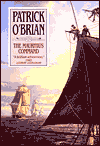The Mauritius Command
by Patrick O'Brian. W.W. Norton, 1994. 348 pages

The Mauritius Command is the fourth in Patrick O'Brian's highly praised twenty-volume series of nautical novels. Like the others in the series, this one centers on the adventures of Jack Aubrey, a captain in the Royal Navy during the Napoleonic Wars, and his friend Stephen Maturin, who is a ship's surgeon of Irish and Catalan descent, a natural historian, and a highly effective spy in the anti-Bonaparte cause.
The beginning of the novel finds Captain Aubrey unhappily ashore, without a ship and supporting a growing family on half pay. He is rescued when orders arrive sending him to the Indian Ocean to counter the French vessels that have been capturing British merchant ships in the region and reinforcing Bonaparte's power on the French-held islands of Mauritius and La Réunion. For the first time, Aubrey is given a temporary command as a commodore, and faces the unfamiliar challenge of commanding not only his own officers but the captains of other ships, who include the savage disciplinarian Captain Corbett and the dashing but unreliable Lord Clonfert.
The campaign to capture Mauritius, the most important French possession in the Indian Ocean, gives the author the opportunity to present an extraordinary picture of the region as it was in the early 19th century. Though most of the book takes place on the water, there are intriguing glimpses of Simon's Town in colonial South Africa, of the British-held island of Rodriguez where Dr. Maturin seeks out relics of an extinct bird called the solitaire, and of La Réunion, which Aubrey captures in a neatly executed joint military and naval operation.
Mauritius itself emerges indirectly, at first through rumors and intelligence reports and then through Captain Aubrey's detailed reconnaissance, both from the sea and in a secret mission on land, in which Aubrey and Maturin meet with potential allies and begin spreading propaganda meant to sap the resistance of the islanders. A first attempt to attack the island fails due to stormy weather, but after a series of attacks on coastal military installations, the British sailors are able to go ashore for supplies, and Maturin meets with "an ancient gentlewoman whose grandfather had not only seen, run down and devoured a dodo, perhaps the last dodo to tread the earth, but had stuffed a bolster with its feathers."
The struggle is far from over, however. An assault on Port South-East, led by Captain Clonfert, goes disastrously awry, leaving Aubrey to face the French forces with severely reduced forces. There are more hard-fought battles and unexpected developments before Mauritius falls to the combined force of British naval force and political intrigue.
All the Aubrey-Maturin novels are based closely on historical fact, and this one is said to be the most accurate of them all. As always, the narrative is free of the wooden characters and musty language that have marred the reputation of historical fiction. The author's erudition is more than matched by his swift pacing, his mastery of 19th century speech, his psychological understanding, and his sense of humor.
From The Mauritius Command:
Christmas, and an immense feast on the upper deck of the Boadicea, with a barrel of providently salted penguins from off the Cape serving as geese or turkeys, according to the taste and fancy of the mess, and plum-duff blazing faint blue under the awnings spread against the fiercer blaze of the Mauritian sun. New Year, with a great deal of ship-visiting; Twelfth Night, and the midshipmen's berth regaled the gun-room with a two-hundred-pound turtle -- an unfortunate experiment, for it was the wrong kind of turtle: the shell turned into glue, and all who had eaten of the creature pissed emerald green; and now Jack began to consult his barometer every watch.
It was a handsome, heavily-protected brass instrument hanging in gimbals by the table on which they breakfasted, and he was unscrewing its bottom when Stephen observed, "I shall soon have to think of another trip to La Réunion. This Mauritius brew is sad stuff, in comparison."
"Very true," said Jack. "But drink it while you may. Carpe diem, Stephen: you may not get another cup. I unscrewed this shield, because I thought the tube must have broke. But here is the quicksilver, do you see, lower than I have ever seen it in my life. You had better stow your bones in the safest place you can think of. We are in for an uncommon hearty blow."


